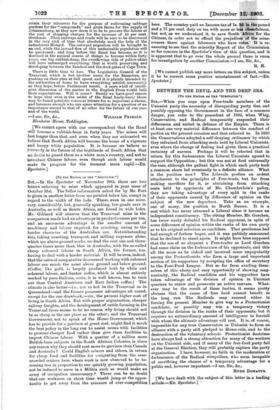[To TIM EDITOR OP THE " SPECTATOR."]
Sra,—In the Spectator of November 28th there are two letters referring to mine which, appeared in your issue of October 31st. The fuller information asked for by Mr. Fort is. given in another letter from me printed below his, except in regard to the width of the lode. These, even in one mine, vary considerably, but, generally speaking, low-grade ores in Australia, as well as South Africa, are found in wide lodes. Mr. Gibberd will observe that the Transvaal mine in the comparison made had an advantage in productiveness per ton, and an enormous advantage in the smaller amount of machinery and labour required for crushing, owing to the harder character, of the Australian ore. Notwithstanding this, taking crushing, transport, and milling expenses alone, which are above-ground works, we find the cost one and three- quarter times more than that in Australia, with the so-called cheap coloured labour in South Africa, the former, too, having to deal with a harder material. It will be seen, indeed, that the rates of comparative dearness of working with coloured labour are much the same above ground and below ground. (Coffee, like gold, is largely produced both by white and coloured labour, and Santos coffee, which is almost entirely worked by pure Italians, costs, it is well known, less to turn out than Central American and East Indian coffee.) The climate is also better—i.e., not so hot in the Transvaal as in Queensland—and the former possesses advantages all round, except for the one drawback,—viz., the present higher cost of living in South Africa. But with proper organisation, cheaper railway freights, and the development of cattle-farming in the Transvaal there seems to be no reason why living should not be as cheap in the one place as the other ; and the Transvaal Government, not to speak of the Home Government, which has to provide for a garrison at great cost, might find it much the best policy in the long run to assist mines with facilities to procure cheaper food rather than give them facilities to import Chinese labour. With a quarter of a million more British-born subjects in the South African Colonies, is there any reason why they should cost more to garrison than Canada and Australia ? Could English i miners and others, in return for cheap food and facilities for emigrating from the over- crowded centres here, where work is now observed to be be- coming less in proportion to our quickly growing population, not be induced to serve in a Militia such as would make an army of occupation unnecessary ? There can be no doubt that our workmen on short time would jump at the oppor- tunity to get away from the pressure of over-competition here. The country paid an Income-tax of Is. 3d. in the pound and a 75 per cent, duty on tea with more or leas cheerfulness, but not, as we understood it, to save South Africa for the Chinese, in order not to offend the prejudices of the mine- owners there against labourers who have votes. It is re- assuring to see that the minority Report of the Commission, so far concurs in the Spectator's view of this question, and it is apparent that to go over the whole ground there is room for investigation by another Commission.—I am, Sir, dm,
R. H.
[We cannot publish any more letters on this subject, unless it be to correct some positive misstatement of fact.—En. Spectator.]


























































 Previous page
Previous page